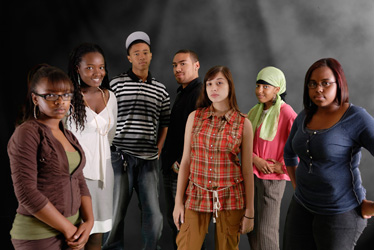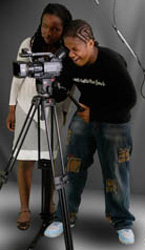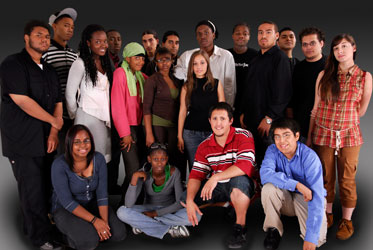What is the story of Ghetto Film School? Did you have a particular "light bulb" moment when it became clear to you that you wanted to do something for children?
In 1999, after a 10-year career as a community social worker in the South Bronx, I was trying out my moviemaker dream at the prestigious School of Cinema and TV at the University of Southern California (USC) in Los Angeles. I knew from the first day at orientation that the graduate production class was lacking some diversity (e.g., no Hispanic or African-American males in a class of 45), but it would come in workshop discussions later in the semester that this would hit me in a more profound way.
The program at USC is absolutely wonderful -- staffed by an impressive array of committed educators, several of whom would offer me many hours of insight and wisdom over the next four months as I set out to plan GFS (their simple golden rule: "Never dumb it down"). Over semester break, I met with a group of young people I knew from my old neighborhood programs, told them I was thinking of starting a film school and asked: "So what do you want in that
kind of program?" Almost immediately, they spoke of what they did not want: did not want to be labeled at-risk or disadvantaged; did not want another social service program masquerading as an arts training; did not want "anything that is going to raise my self-esteem!" One participant chimed in, "Yeah, it's not like we want a ghetto film school," and the name was born.

With three used cameras, some computers and a storefront space on loan from a local school, we started the first GFS class July 1, 2000. Two classmates from USC, moved to my neighborhood and we all led different classes, actually using USC handouts and assignments from the graduate production course we had just completed!
That first summer 9 people completed their projects, and we had a screening and drew a packed crowd of 250 people to a small theatre in Spanish Harlem. The post-screening party went well into the night, and the enthusiastic reviews of the students' work -- accomplished when we were really still figuring things out - convinced me that we were onto something good.
For the next two summers we did GFS, changing the curriculum each year to fine-tune our methods. I would work as a non-profit consultant during the rest of the year, and in the summer a 19-year-old college student named Andrew Unger came in and we taught class. I'm not so sure I could've continued this schedule (as exhilarating as it was) financing a part-time
GFS with my own resources and some small grants, plus working as a consultant year-round...it was starting to feel like two full-time jobs. 2003 was a watershed year for two important meetings: one by chance that Andrew had with a prominent filmmaker, and the other the result of policy from New York City's new "arts mayor."
David O. Russell met Andrew while receiving an honorary degree from his alma mater at Amherst College, and a month later hosted the two of us in his home -- minutes into seeing one of the kids' project, he turned to me and said "You know Joe, I should be on your board and then I could really help you
guys." What?! Without David there is no
GFS today, as he was the one who skillfully brought us the industry people
with the committment, skills, resources and good heart to build the
organization -- most importantly his friend, and now my mentor, NYC-based
film producer Rachael Horovitz (our board chairman for the last three
years). David selflessly organized his famous friends, money from studios,
anything we asked he did -- never once craving recognition for his
incredible, catalytic role.
A few weeks after David joined the board, Kate
D. Levin (Commissioner of the NYC Department of Cultural Affairs) visited
our program on her tour of the South Bronx. We had three staff in a summer
program with a $50,000 annual budget and here we were getting great insight
and feedback from the arts commissioner! In many ways, this visit was a
precursor to what the new Bloomberg administration would become known for:
if one had a good idea, they would check you out and you could work with the
City and get access -- even if you were small and without the political
connections or lobbyists that circled other administrations. The technical
assistance that Kate and her staff would provide gave us confidence, made us
feel part of a larger NYC arts community, and the inspiration to grow our
dream.
How does filmmaking as an art, as a medium tie in to your larger goals for GFS? What is it about cinema that makes it the perfect conduit for what you're trying to achieve?
Moving images -- whether on film, video, digital or some yet determined
technology -- is the storytelling medium of the 21st century. It's what
today's kids want to master, as well they should.

The Ghetto Film School (GFS) was built on the belief that more stories, from
more kinds of young people, could bring benefit to all kinds of audiences
and communities; if GFS were successful, as a supportive community of visual
storytellers and filmmakers, that success would ultimately benefit cinema as
a whole. Our impact would be both with the individual GFS student and a
host of stakeholders: filmmakers, entertainment industry, university and
education partners, new audiences and new producers.
This is an intentionally audacious sense of purpose, but it has guided us
from our early days working in a small storefront in the Hunts Point section
of the South Bronx -- today, whether we are planning a city-wide high school
for film and digital media, or a shoot in a foreign country, the question
"How does this benefit our students and cinema?" helps keep mission, a
commitment to quality and young artists in alignment.
What are the basics of GFS -- how does the program work, what choices do
the students have? How do they get paired with their mentor? How long does
the program last?
Our Fellows Program is designed to train emerging filmmakers and
intentionally build a sustainable creative community. It is not for
everyone, but for that teenager that lives and breathes movies it is a truly
wonderful home base.

The Fellows Program covers three courses over a 15 month period: 1) a
GhettoFilm101 summer intensive, with everyone writing, casting, directing,
shooting and editing their own 6 minute non-dialogue short that screens at
our annual Lincoln Center screening event in September; 2) an Industry101
course that prepares students for the business side of things, with
workshops and seminars throughout the year leading to an internship the
second summer; and, 3) The Thesis Project, a collaborative film with
students crewing specialized roles, shooting on location in a foreign
country.
After the Fellows Program, students receive individualized instruction and
access to all facilities and equipment. Throughout their GFS experience,
they will meet top filmmakers, cinematographers, editors -- all kinds of
creative folks who are determined to give back and support the next wave of
new talent. Throughout every aspect of GFS and its programs, we emphasize
reciprocity and a give-get philosophy to build a long-term supportive
community.

Veteran Fellows return from college to teach in the summer, PA
on shoots, work on revenue-generating projects from our student operated
Digital Bodega production company, or share their college experience at a
financial aid workshop for GFS parents. All our students know the stories
about those before them who built the organization that now helps them -- and
they too will create new opportunities for those that will follow.
How did you find your first group of students? How do you choose them
now? Are there any students you've worked with who stick out in your memory?
The first group of students came from youth programs and schools that I ran
or knew from my days as a social worker. In the four weeks since I'd
returned from Los Angeles I went around and made presentations, meeting as
many young people as possible. I got the City of NY to certify the program as
a placement for the federal summer jobs program, so that was one incentive
early on - the other is that we had some college-bound high school students
who realized that having this kind of summer experience might help their
school applications.
The girls stood out for me that first summer, because so often we were
hearing about women being underrepresented in film, and yet they were the
stars of this group. Sharay Smith, all of 14, made an all-time GFS classic
Hell Hath No Fury, which was a big hit two years later when she screened it
at a film school we visited in Mexico City. Alvy Johnson, a high school
junior our first summer, is now in her final year of graduate screenwriting
program at Columbia -- the last two summers she has returned to assistant
teach at GFS, and she's worked at Comedy Central, Lee Daniels Entertainment
and other great places. She will no doubt be a wonderful TV writer.
The early years I always emphasized to the students that while they were
learning about filmmaking they were also building GFS. Without any doubt it
has been the talent of those early students -- more than any other single
factor - that can explain the relatively fast growth and success the
organization has seen over its seven years. Frank Lopez was 16 when he made
Reflections, the piece that caught David O. Russell's eye. There are so
many others, who impressed in so many ways, that led people to want to be
connected to GFS.

How do your students continue with what they've learned at GFS? What
projects have they gone on to do?
Since we went to the current 15-month Fellows Program model three years ago,
at least a dozen of our students have worked on a professional film -- large
and small. More than 35 have interned or worked at a range of companies.
They've made advanced GFS projects in Mexico City, Paris and Germany -- and
every year, their work screens at dozens of festivals around the US and
internationally. Most of the current Fellows are still in college, studying
at film programs like Columbia, NYU, Hofstra and Purchase.
What is the ultimate goal of GFS? Do you find that this goal ties in with
your own ideas about the goal of activism, volunteering, etc -- Do you even
feel like GFS falls into those categories at all?
The ultimate goal of GFS is to be a sustainable creative community, right
here in the South Bronx. A place known for high-quality instruction and
product, product that has both commercial value and a story that can
enlighten others. This community should be relevant to and have value for
its members at any stage of their career in film, or if they change their
professional interests. Someone who is trained at age 15 receives help at
age 35, getting their script read by the right producer -- maybe a contact of
another GFS veteran, a board member or other stakeholder.
Growing up in our working class family my brother Daniel (currently the
writer-in-residence at Amherst College and an award-winning poet) was
extremely smart, creative and somewhat of a Martian to the rest of his
siblings and parents -- who is this guy? While we loved him, it was not in
our ability to support his artistic pursuits -- which were spectacular and
many. Artists are wired differently, and unless they have parents who are
also artists, or extraordinarily gifted in supporting that, well those
teenage years can feel like war. GFS seeks to be that support for creative
youth -- being part of an organization helps "legitimize" their pursuits,
knocking down obstacles for them until they get their creative legs strong
for the long haul.

I think that building in the intentionality of reciprocity, from the
beginning of one's experience at GFS, we can train young people to achieve
their creative and professional dream in a way that cultivates their own
good heart and brings benefit to others. Ultimately this makes them more
effective, in anything they do.
Photos By Fruit Extrana